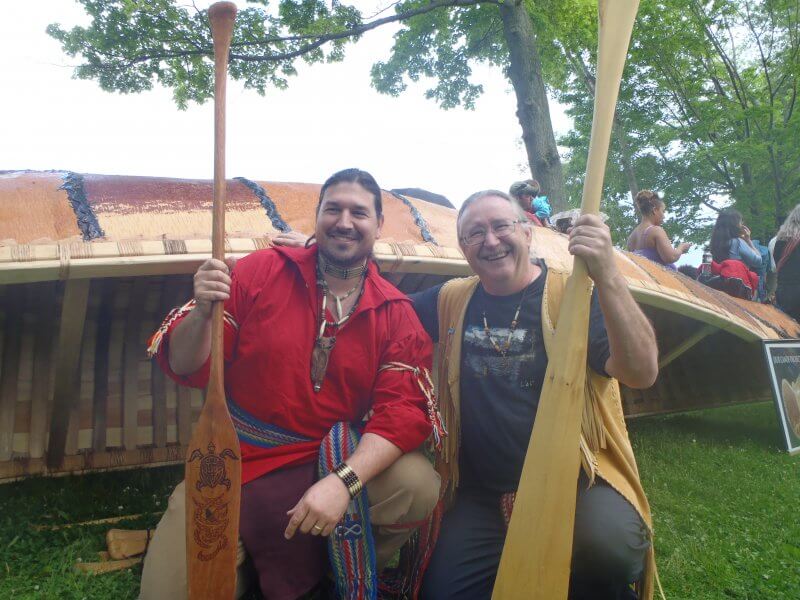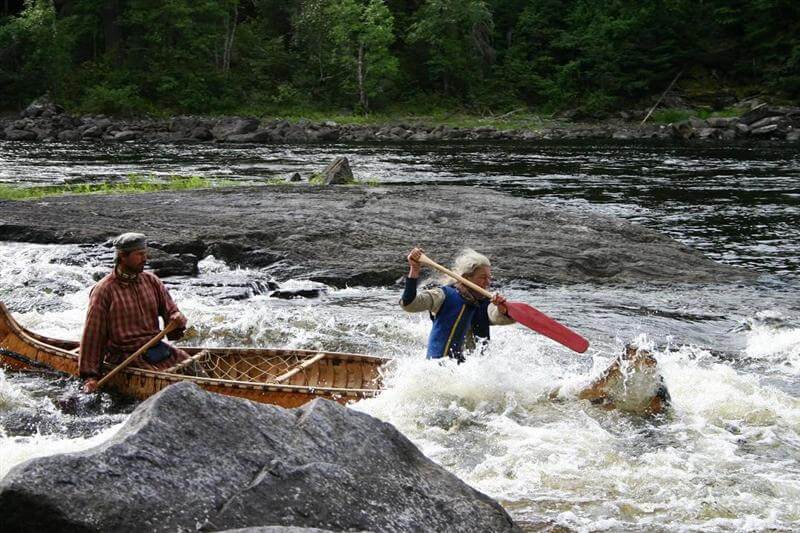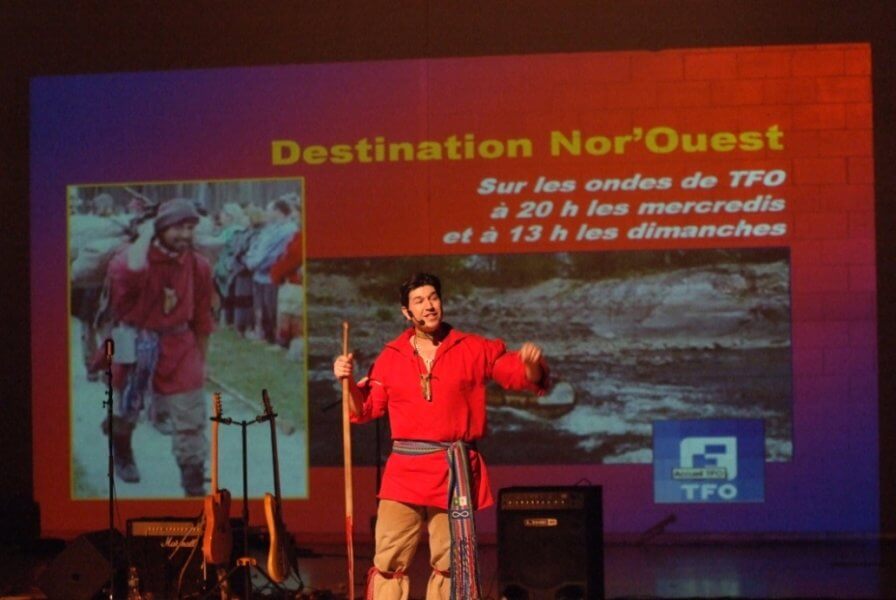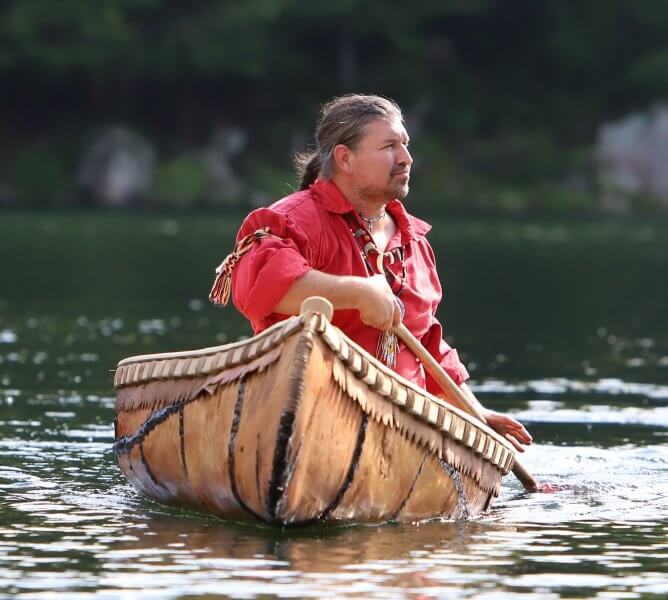Reading time : 7 minutes
[LA RENCONTRE D’ONFR+]
OTTAWA – Christian grew up in Azilda, not far from Sudbury and later near Lake Superior. Coming from a family of hunters and fishermen, he is today a voyageur, traditional Anishnabe canoe maker who lives in Ottawa. This Franco-Ontarian bears the spiritual name of Siegebreaker. Carrying within him the duty of sharing, he tells who he is and what it means to be Métis, proud of his history and his ancestral roots..
“How do you live your dual Franco-Ontarian and Métis identity on a daily basis?
In fact, for me, it is not a double identity. It’s just my identity. Besides, being Métis is not just one thing. We’re not just one thing in life. My ancestors were from France and married Anishnabe, so Métis. I explain it as hybrid fighters: we took the best from the native side and the European side, then we put it together. Unfortunately, we are also rejected on both sides, either you are too white on one side or you are too Indian on the other.
All that to say that my identity is to be between the two. As a Métis, I am the natural bridge between the two sides and I understand both sides.
It has its share of difficulties and where I feel really good is in the forest. There, there are no stereotypes, no prejudices, no racism.
It is partly for this reason that I build birch bark canoes, to establish and build relationships. It is a gift from our Anishnabe ancestors. They shared it with the French at the time. We are still in the canoe, we natives, and we want to paddle together.
What is your personal situation with regard to the difficulties that the Aboriginal community may encounter. Have you been discriminated against?
Yes, and on both sides. I was told, once that the most racist towards blacks were the blacks, then the most racist towards the aboriginals were the aboriginals. It sounds funny and yet lateral violence actually exists. In Eastern Ontario, it was often talked about, even if it’s pretty much everywhere, to be honest. I’ve already heard that the Metis from the East didn’t exist.
With the non-Aboriginals at school, it was when the students knew I was Aboriginal: they pushed me away. As a child, I saw it clearly, that I was different, I looked at photos of myself, then I said to myself “wow”, it looks like I’m not like the others, but I didn’t show it.
When did you really know your Aboriginal identity?
Late, it’s simple, we didn’t talk about it at home. It was secret, but I knew we were different. Not everyone talks to animals and trees. When I was young, during family celebrations and when the drink took effect, it talked and I learned a little more. But it wasn’t until my great-grandmother died – the matriarch – that I started learning more about my culture. So, it’s a harsh reality, but we were assimilated, because we hid our identity. I must have been 28 really, when I started looking for answers.
In our small town of Azilda, when we were children, we were asked if we were Italian or Portuguese, so we answered yes.
On the other hand, French is my first language, even if we spoke a little Michif, which is a mixture of old French and the language of the region.
You see the Métis flag, the infinity sign on a blue flag, well to me that sign looks like a mask and we wore that mask for a long time. This sign, with two loops, represents the two cultures, European and Aboriginal, to create a single one, the Métis nation. But still, we go unnoticed.
After discovering your culture, how did this translate into your daily life?
There have been several stages, but today is the fun, when I meet my cousins who have children. The young people know that when there is Uncle Christian, we will go into the woods (laughs).
But, it’s really thanks to my participation in the show Destination Northwest, that a door opened. I met natives there who recognized me as one of their own. Then I met Marcel Labelle, my eldest. He was the one who showed me how to build a bark canoe, among so many other things. Building canoes is a great activity that I do with schools and young people.

I can’t go back, but that’s why I share a lot of my culture today. Especially with my canoe projects. I take part in ceremonies and I bring people there, to give them more time than I had. The other thing I realize is that I don’t need to catch up on what I didn’t learn in childhood, because my base is there, it always has been there. It’s just that it wasn’t explained to me, but I experienced it anyway. Our culture is based on nature, observing, learning and listening is the teaching we need.
The teaching I received comes largely from Marcel. I remember him telling me, “You take the teachings you hear and bring them out into nature. If you do not find them in the forest, it is because this lesson is part of your assimilation. If you find them in the forest, you’ve come to the right place.” This is a directive that always follows me.
What are the values you hold dear? Is the connection to nature an indigenous value?
It is by being human that we have a relationship with nature, basically we are animals, but we have forgotten that. We assume that you have to go deep into nature to connect with it, but in fact it is not necessary, it is as simple as developing a relationship with a plant in your house.
I host a show on APTN, the Aboriginal Peoples Television Network, The earth within usand I try to explain our links with nature among others.
When you go to the forest, don’t look at a tree as just a tree, or a bird as just a bird. Look as if it were you, like your relations, your brothers, your sisters and you will see your perception will change completely, then you will live differently too.
We have this desire to take, take, take, when we have to ask permission. I take the time to observe and listen. Which tree wants to participate and which tree wants to offer me its roots? It takes a moment of reflection before taking, you have to be aware.
What advice would you give to people who would like to get closer to Aboriginal values?
Spirituality. The mere fact that we are alive makes us spiritual beings. To feel is to be spiritual. You have to listen and slow down. A friend explained to me that we have seven gifts, two eyes, two ears, two nostrils and a mouth. However, we always start by speaking, we use the mouth. We should actually look first, look at the people, the birds, the earth, the planet, whatever. Then listen and feel the other, before speaking.

Then, you know, people come to see us asking what they can do for the Métis, the Inuit, the First Nations. And I often answer them: “You are mistaken, we are here to help you”. We already have our culture, our traditions, our ceremonies, our language. We all have cultures and practices, but Aboriginal culture can be a stepping stone to self-discovery.
We talk about reconciliation, but here I am not talking only with Canadians, but also between men and women, between the First Nations, the Métis and the Inuit. There’s still much to do. We are asked to share many teachings, and to guide others, but we must heal from our losses. With each tragic event, we must mourn.
You have done many shows for television in order to transmit your culture and your history. What are your projects ?
I’ve been doing this for 17 years. I met a lot of people and got very positive feedback. I met students, who today are parents and who remember. I have a duty to share my knowledge. If I die tomorrow, I won’t be able to share it. Several of my former students now at the University write to me sometimes, either to have news, or within the framework of their studies. Often they need us to meet, but if you’re not far away we’ll take a walk and we’ll go into the woods. It is very important, so that I transmit these values.
Today with my canoe factory, I also make baskets, bracelets, jewellery. I’ve been doing this mostly during the pandemic, but regardless, I’m trying to use whatever the tree has given me.

I am in a Montreal theater company which is the first francophone and aboriginal company. Then in Ottawa, I play for the company La vieille 17, where I’m part of a troupe and we play a piece called Delphine is still dreaming. It is a piece made by natives and non-natives.
I host web-series and I do shows. Then if not, I let myself be guided, where I’m going, I don’t know! One thing is sure is that I am indebted to the community. My spiritual name, Seatbreaker, is an elder’s name, and it’s my skill, it’s who I am. Me, I break cultural sieges, stereotypes and prejudices towards the nation. Everyone has a spiritual name, even you. We are all indigenous to somewhere. »
KEY DATES FOR CHRISTIAN PILON:
1975: Born in Ottawa
1997: Obtaining a black belt in Martial Arts
2004 : Issue 180a look back at a traumatic moment in Christian’s life
2005: Destination Nor’Ouest – 100 days in a bark canoe from Montreal to Winnipeg
2010: Meeting with his elder Marcel Labelle
Every weekend, ONFR+ meets with a player in Francophone or political issues in Ontario and Canada.
Meeting with Christian Pilon Métis and Franco-Ontarian from Ottawa

